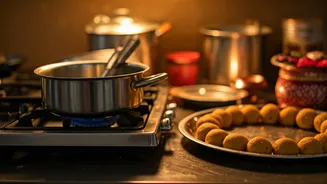The Kitchen's Heart
At the heart of Diwali celebrations lies a bustling kitchen, often presided over by mothers. Their dedication ensures the traditional dishes that define
the festival are prepared with care and precision. This crucial task, which involves meticulous menu planning and timely food preparation, is a cornerstone of family gatherings during Diwali. They manage complex dishes, drawing on years of culinary expertise and cultural knowledge to keep the tradition alive. The kitchen is where the festive spirit is truly ignited, with mothers working tirelessly to create the culinary delights that embody the spirit of the celebration, ensuring that the aroma of festive foods permeates every corner of the house and builds anticipation for the joyful days ahead. Their commitment highlights the deep-rooted importance of food and family during Diwali. The value of their work is often taken for granted in the rush of the holiday, but it underscores the critical role they play in keeping traditions alive.
Traditional Dishes Prepared
The crafting of traditional dishes during Diwali is a testament to the mothers' commitment to upholding cultural heritage. These dishes are more than just food; they are powerful symbols of the festival's essence, connecting families to their ancestry. The recipes are carefully passed down through generations. Mothers' hands work meticulously to prepare sweets and savories, from the carefully rolled ladoos to the delicately fried puris. Each step reflects a deep reverence for tradition and a desire to provide a memorable experience for the entire family. These recipes are the heart and soul of Diwali, and the preparation work ensures that the aromas and flavors of the festival fill the home, weaving a tapestry of memories and connections that celebrate the essence of Diwali. They bring the family together around the table to experience the taste of the season.
Time and Dedication
The effort that mothers invest in preparing for Diwali often demands a significant amount of time and effort. From the early morning hours until late at night, they are focused on organizing and executing their responsibilities, showing their unparalleled dedication. The meticulous planning is a labor of love, incorporating everything from shopping for ingredients to overseeing the cooking process. Their determination ensures that the family's Diwali celebration is not only memorable but also in line with time-honored customs. The long hours demonstrate a deep love for family and a genuine desire to make the festival a joyous occasion for everyone. This commitment sometimes means sacrificing their own chance to participate fully in the festivities, but this sacrifice underscores the significant role mothers play in creating a joyous and unforgettable Diwali experience.
Celebrating Togetherness
While the kitchen is the hub of activity, the essence of Diwali is about togetherness and shared experiences. However, the demanding tasks associated with meal preparation can, unfortunately, limit mothers' participation in the broader celebration. As families gather to share meals and create memories, it is important to reflect on the importance of including mothers in these moments of joy. Creating a more balanced approach allows mothers to enjoy the fruits of their labor, celebrating alongside their families. By making some small changes, such as distributing tasks, families can ensure that the mothers’ contributions are appreciated and that they also have a chance to take part in the festive fun. This approach reinforces the concept that Diwali is a festival for everyone, fostering an environment where mothers can both contribute to and enjoy the celebration.

















